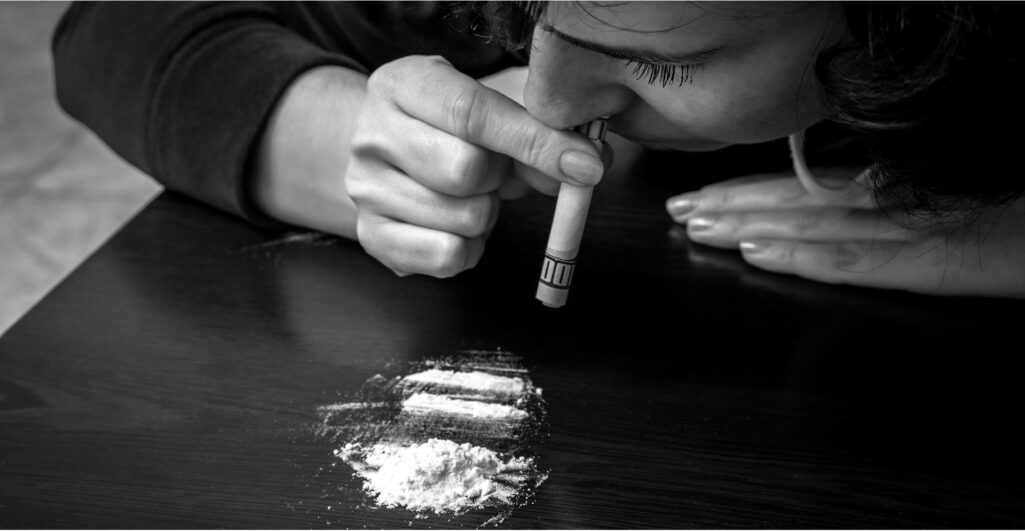For many people, cocaine is used to feel confident at parties or keep energy high, with no harmful intent. Yet, the psychological euphoria cocaine brings can be addictive, and what starts as a social habit can eventually become difficult to control. Even when you promise yourself not to use again, that weekend boost can begin to creep into workdays or nights in with friends.
In the UK, cocaine remains one of the most commonly used illegal drugs, with around 3.8% of 16 – 24-year-olds reporting using powdered cocaine in 2024. Although it’s often associated with success and confidence, cocaine dependence can affect anyone, from professionals balancing demanding careers to parents, students, and people using it to cope with anxiety or low mood.
If you’ve found yourself relying on cocaine more often than intended, or are worried about someone close to you, understanding how cocaine addiction develops is the first step toward regaining control. This page explores what cocaine is, how it affects the brain, and the signs that use may have crossed into dependence.
What is cocaine addiction?

Cocaine is a powerful stimulant drug made from the leaves of the South American coca plant. It’s usually produced as a white crystalline powder, which can be snorted through the nose, dissolved and injected into a vein, or rubbed onto the gums, to experience a short-lived feeling of euphoria.
When someone feels compelled to use cocaine, even if it is causing harm, this is known as cocaine addiction. This usually starts when a substance is used as a coping mechanism to deal with underlying issues, such as anxiety or trauma. Over time, this can lead to reliance, meaning they need to have it just to feel “normal”, and if they can’t, then they are likely to experience uncomfortable withdrawal symptoms.
Why is cocaine addictive?
When cocaine is ingested, it stimulates the brain’s reward sensors, causing them to release high levels of dopamine. This hormone is naturally released when the brain has positive experiences, such as excitement, smelling something nice or doing a rewarding activity, such as exercise. Cocaine allows this ‘happy hormone’ to be released artificially, making it a tempting option for those feeling low, lacking in confidence or needing a boost of energy.
This dopamine surge produces short-lived effects such as:
- Heightened confidence and sociability
- Increased energy and alertness
- Reduced appetite
- Temporary feelings of euphoria
As this feeling is synthetic, the effects don’t usually last for longer than 1 – 30 minutes, meaning people often take repeated doses to maintain this sensation. If this behaviour persists over time, the brain begins to expect this increase in dopamine and stops producing it naturally. In these cases, cocaine can become addictive, as people rely on taking more of it to maintain natural levels of dopamine, and experience negative feelings if they try to stop using cocaine.
How to spot the signs of cocaine addiction
The reality of cocaine dependence is still misunderstood. At the Haynes Clinic, we’ve helped many people who have looked for the wrong signs. It’s common to still picture addiction as something that only happens to those who have visibly “lost control” or hit rock bottom. It’s not often imagined that this could impact professionals, parents, or high achievers, but anyone can develop a dependence on cocaine, and addiction can hide quietly behind the appearance of success, making the warning signs easier to overlook.
Cocaine use disorder (CUD) can be difficult to recognise at first. Many people appear to function well for a time, holding down jobs, relationships, and social lives, even as their intake becomes more frequent or secretive. However, as dependence grows, cocaine begins to affect mood, behaviour, and priorities in ways that are hard to hide.
Below are some of the signs we recommend looking out for.
Signs of cocaine dependence in yourself
You might notice that cocaine use is starting to take up more mental and emotional space than before. Some common indicators include:
- Thinking about the next hit or craving cocaine when you don’t have it
- Taking larger amounts or using more frequently than intended
- Feeling anxious, irritable, or low during comedowns
- Struggling to relax, socialise, or perform at work without cocaine
- Financial difficulties from spending more than planned on cocaine
- Hiding or minimising use around family and friends
If you recognise any of these signs, it may indicate your relationship with cocaine has shifted from casual use to dependence.
Signs that someone else is reliant on cocaine
Spotting cocaine addiction in a loved one can be painful and confusing. Some of the following changes may suggest that cocaine use has become a serious issue:
- Sudden mood swings, irritability, or bursts of confidence followed by exhaustion
- Frequent sniffing, nosebleeds, or a constantly runny nose
- Noticeable weight loss or reduced appetite
- Unexplained financial problems, secrecy, or borrowing money
- Withdrawal from friends, family, or normal activities
Five ways cocaine addiction hides in plain sight
Unhealthy relationships with cocaine usually creep in slowly. The early stages often blend seamlessly into normal life; late nights may be justified by “stress relief,” or extra lines excused as “a little motivation”.
Because cocaine temporarily enhances energy and confidence, people often associate it with positive additions to their performance or personality, making allowances for the damage it causes.
1. It disguises itself as feeling in control
Cocaine creates an illusion of productivity and power. At first, you might feel more focused or social. However, over time, that confidence becomes dependent on using the drug and life without it feels flat or anxious.
2. It thrives on secrecy
Many people with cocaine dependence are experts at hiding it from partners, friends, and even themselves. Excuses such as “just weekends” or “only to get through this presentation” can mask an emerging pattern that’s already shaping thought and behaviour.
3. It feeds on pressure and performance
Cocaine is often used by professionals, parents and entrepreneurs who are juggling high demands. The substance becomes a coping mechanism to stay sharp or emotionally numb. But the more it’s used to function, the harder it becomes to feel stable without it.
4. It rewires emotional responses
Over time, cocaine dulls the brain’s natural reward system. Activities that once felt fulfilling – such as spending time with family, exercising or creative hobbies – lose their impact, replaced by cravings for the next high. This emotional monotony is one of the first hidden signs of dependence on cocaine.
5. It keeps you in denial
Cocaine’s short-term boost can make it easy to dismiss early warning signs. Fatigue, irritability, and mood crashes are often blamed on work or lack of sleep rather than the drug itself. This self-rationalisation is one reason many people don’t seek help until the consequences become impossible to ignore, and we’ve helped hundreds of people to reverse that psychology.
Overcoming cocaine addiction

Realising that cocaine has taken hold of your life is a huge breakthrough and the first step in overcoming its grip. Cocaine use disorder doesn’t develop overnight, and neither does recovery. By taking small steps in reducing drug use, learning healthy coping behaviours and building groundwork with a trusted support group, we can help you reconnect with life without the comfort of cocaine.
We understand that psychological dependence on cocaine is built on the belief that it’s needed to make you work better or be a more confident person. Trust us when we tell you that’s far from the truth – all of us at The Haynes Clinic have overcome our own emotional journeys with drugs. By finding a kind and professional support network, we each slowly rebuilt trust, faced what was driving us to turn to these substances and took back control.
When you feel ready, we are here to help you through the same journey. We’ve built a recovery programme that nurtures connection and offers a range of therapy tools to help you feel comfortable letting go of cocaine. Whatever your concerns are, we can put you at ease about what to expect and teach you the means to rebuild a life full of connection, holistic workshops, and realistic and catered life goals, to be free from cocaine for the long term.
Contact us today to start an honest conversation about your relationship with cocaine and how recovery could look for you.
Cocaine addiction FAQs
Can you become addicted to cocaine after using it just a few times?
Yes. Cocaine’s effect on the brain’s dopamine system means tolerance can develop quickly, even after a short period of use. Repeated exposure to cocaine, even in small doses, can alter reward pathways and increase the risk of dependence.
Why do people use cocaine even when they know it’s harmful?
Cocaine stimulates the release of hormones in the brain, causing immediate bursts of pleasure, energy, or stress release, making it an attractive option for anyone struggling to meet deadlines or keep their energy up, or to disassociate from painful feelings.
Over time, the brain begins to link cocaine with relief and control, making it harder to resist even when you know it’s causing harm.
What happens to your brain after stopping cocaine?
When someone stops using cocaine, the brain slowly begins to find its balance again. In the early weeks, it’s common to experience higher levels of anxiety, paranoia and fatigue, which occurs because the brain is readjusting after being overstimulated for so long. With time and psychological support to help through difficult periods, those natural feelings of motivation, energy, and pleasure start to return.
Does cocaine addiction affect men and women differently?
While men and women may experience cocaine addiction differently at the start, with women sometimes progressing more quickly from use to dependence and men tending to begin at a younger age, addiction impacts everyone, regardless of gender, in ways that challenge connection, trust, and self-worth.
Overcoming CUD involves similar steps for everyone, including rebuilding trust and relationships, exploring the reasons that drove cocaine use, and learning healthier ways to cope.
